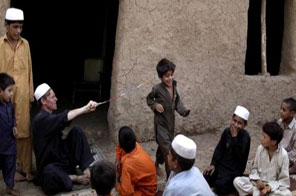Afghan offensive displaces at least 1,240 families
LASHKAR GAH: At least 1,240 families have fled a military onslaught against the Taliban in southern Afghanistan, many sheltering with friends and relatives, the local government said Tuesday.
No camps have been set up for the displaced, said a spokesman for the governor of Helmand province, where 15,000 foreign and Afghan troops are laying siege to a Taliban stronghold.
"We deliberately did not give permission for the camps to be set up for the 1,240 families who are displaced because we did not want the camps to become permanent," spokesman Daud Ahmadi told AFP.
The average Afghan family has five to seven members.
The refugees are "living with their relatives or have rented houses" in the provincial capital Lashkar Gah, Ahmadi said, adding that a number of international agencies were giving assistance.
Hazrat Bilal said the condition of his family, who left the target area of Marjah for Lashkar Gah ahead of the Saturday launch of the operation, was "very bad".
"We settled here with our relatives, 20 people in one room, including men, women and children," he said, as he queued to buy bread at a bakery.
"We have received some assistance but it is not enough. It is a life of sheer poverty and I'm just hoping things get better soon so we can go home. I cannot imagine what has happened to our house, our cows, our chickens."
Lashkar Gah is only one destination for the displaced, and Ahmadi was unable to say how many people had fled elsewhere.
US, NATO and Afghan troops are pursuing a major operation in the Marjah and Nad Ali districts of Helmand to push out Taliban militants who together with drug lords have controlled the area for years.
Operation Mushtarak ("together" in Dari) is expected to last some weeks as troops appear to be bogged down by snipers and home-made bombs planted by the Taliban.
The UN's Office for the Coordination of Humanitarian Affairs said last week that food and emergency shelter were being organised for refugees fleeing to Lashkar Gah, 20 kilometres (12 miles) north of Marjah.
On Monday it said that at least 900 families had fled Marjah and Nad Ali since the start of Operation Mushtarak, adding that they were being given "kits" of food and other items and emergency shelter was being organised.
Last week, residents packed relatives, belongings and livestock into cars, buses and tractors to get out of the area, which had been the scene for weeks of a massive military build-up.
Bijan Farnoudi, a spokesman for the International Committee of the Red Cross, said it was difficult for people to move between the targeted areas and Lashkar Gah as roads were littered with mines and blocked by troops.
Norine MacDonald, president of the London-based think-tank the International Council on Security and Development, which has an office in Lashkar Gah, said tribal elders had requested a delay to the operation until after winter.
"To not heed the request of the elders to delay until spring brought warmer weather to shelter the inevitable refugees is troubling," MacDonald said.
"We have been told that the new approach to operations would be to put the concerns and interests of local residents first, and the process that was used here does not support this at all."
Nasir Ahmad, 18, said the discomfort of displacement would be worth it if his village were to come under firm government control.
"The pledges for building schools and clinics, and bringing real security to our areas and villages will make this worthwhile, but if there are no schools, no clinics but just empty promises, this would be very difficult to accept," he said.






